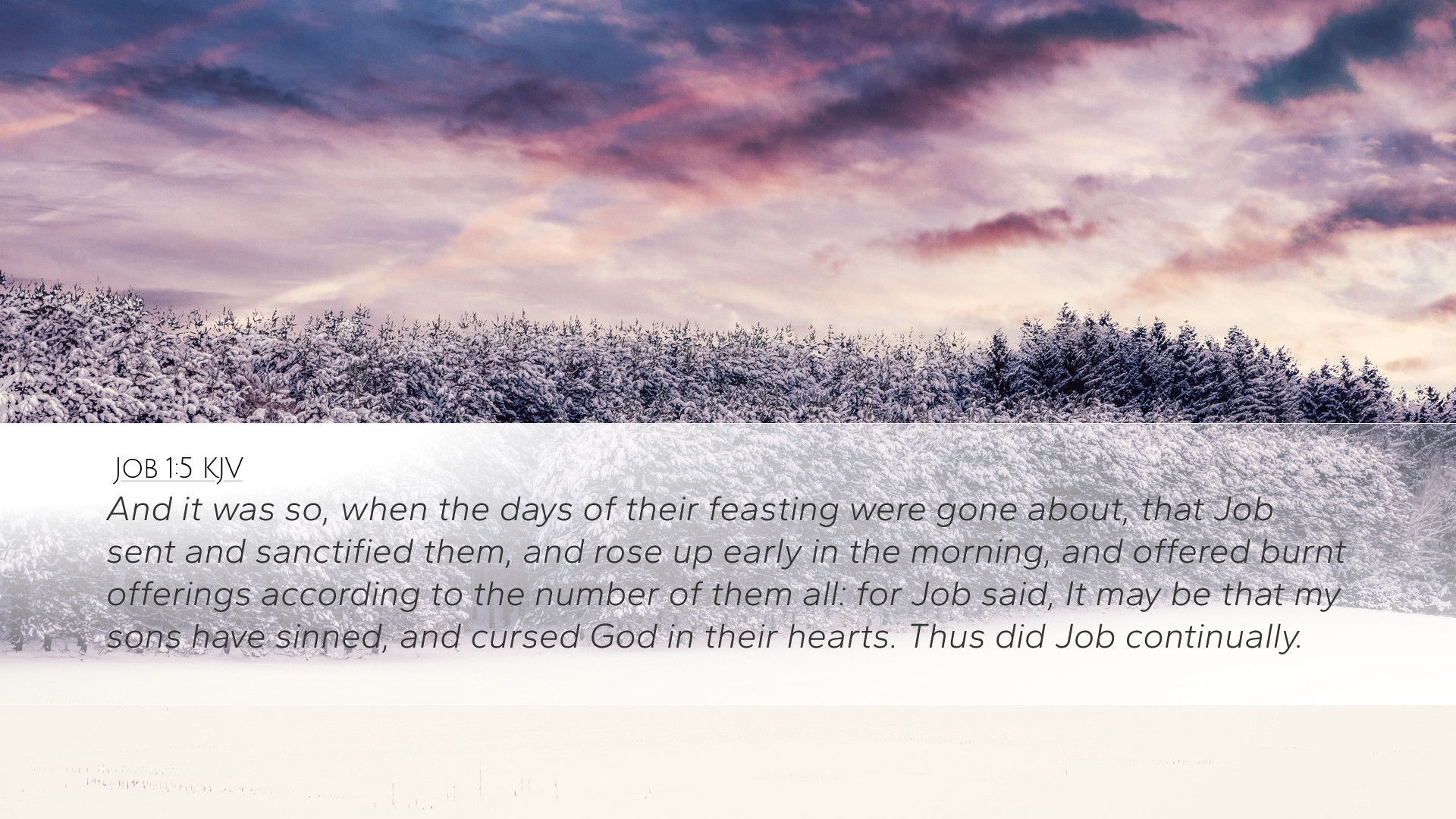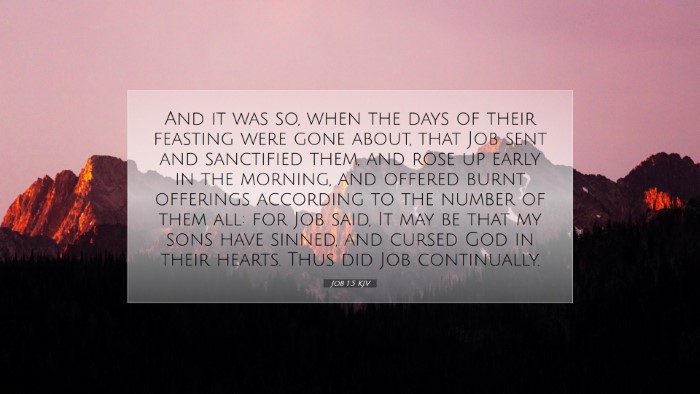Old Testament
Genesis Exodus Leviticus Numbers Deuteronomy Joshua Judges Ruth 1 Samuel 2 Samuel 1 Kings 2 Kings 1 Chronicles 2 Chronicles Ezra Nehemiah Esther Job Psalms Proverbs Ecclesiastes Song of Solomon Isaiah Jeremiah Lamentations Ezekiel Daniel Hosea Joel Amos Obadiah Jonah Micah Nahum Habakkuk Zephaniah Haggai Zechariah MalachiJob 1:5
Job 1:5 KJV
And it was so, when the days of their feasting were gone about, that Job sent and sanctified them, and rose up early in the morning, and offered burnt offerings according to the number of them all: for Job said, It may be that my sons have sinned, and cursed God in their hearts. Thus did Job continually.
Job 1:5 Bible Commentary
Commentary on Job 1:5
Job 1:5 states, "And it was so, when the days of their feasting were gone about, that Job sent and sanctified them, and rose up early in the morning, and offered burnt offerings according to the number of them all: for Job said, It may be that my sons have sinned, and cursed God in their hearts. Thus did Job continually."
Contextual Overview
This verse sets the tone for the entire book of Job, demonstrating the righteousness of Job and his protective nature towards his family. Understanding the socio-religious background of Job provides essential insights into the text.
Job’s Character
Matthew Henry highlights Job's exemplary character, describing him as "a man of integrity and piety." His actions reflect not only a profound sense of responsibility for his children but showcase his fear of God and commitment to living righteously. This verse indicates that Job was acutely aware of the spiritual standing of his family and endeavored to intercede on their behalf.
The Practice of Sanctification
In this passage, Job's act of sanctifying his children is noteworthy. Albert Barnes offers an interpretation that underscores the significance of this solemn act. It signifies Job's awareness that his children may have engaged in behavior that was not congruent with their faith, particularly during times of feasting. The ritual of sanctification involved serious consideration of God’s holiness and the gravity of sin:
- Intercessory Role: Job acted as a priest for his family, demonstrating a deep commitment to their spiritual wellbeing.
- Burnt Offerings: The continual sacrifices highlighted the seriousness with which Job regarded sin.
The Significance of Sacrifice
Adam Clarke elucidates the nature of burnt offerings, noting that these sacrifices symbolized complete devotion to God. Job's offerings were a means of seeking atonement for his children—rooted in the theological understanding that even unconfessed sin could endanger their lives before God.
Job’s Motivation
The text reveals Job's motivation: "It may be that my sons have sinned..." This phrase reflects a parental instinct coupled with spiritual wisdom, alerting readers to the reality of sin in human nature and the need for repentance. Job recognized that children, with their personal encounters and choices, require guidance and spiritual oversight:
- **Parental Concern:** Job exemplified deep concern for the spiritual state of his children, indicating that he took their moral and spiritual education seriously.
- **Understanding of Sin:** His acknowledgement that they "may have sinned" reveals a realistic perception of human frailty.
Job’s Devotion
The phrase, "Thus did Job continually," serves as a poignant reminder of Job’s unwavering devotion. This commitment entailed regular sacrifice, illustrating a lifestyle marked by consistent righteousness. According to Henry, this continual practice was indicative of Job's deep faith and reliance upon God, contrasting sharply with the impending trials he would face.
Theological Implications
Pastors and theologians may draw significant theological implications from this verse, such as:
- The Nature of God’s Justice: Job’s righteousness raises questions about divine justice and the suffering of the innocent.
- Human Responsibility: This passage encourages believers to take the moral responsibility to intercede for others, reflecting a broader Christian calling to prayer and supplication.
- The Heart of Worship: Job's sacrifices indicate a heart that desires communion with God, an essential reminder for contemporary believers.
Conclusion
Job 1:5 provides deep insights into the character of Job, the nature of sin, and the extent of parental responsibility. The theological implications for pastors and scholars are profound, encouraging a deeper exploration of righteousness, intercessory prayer, and the journey of faith amidst suffering. As Job persistently sought God on behalf of his children, so too are Christians called to embody such faithful devotion in their own lives.


